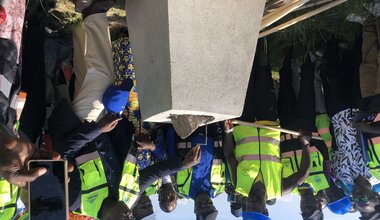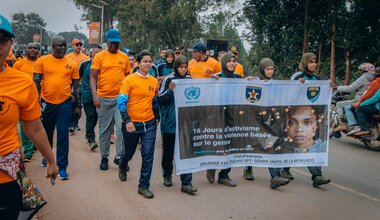Bruno Lemarquis: “MONUSCO’s withdrawal from Tanganyika reflects an improvement in the security situation”
While on a working visit to Tanganyika province since 17 June 2022, the Deputy Special Representative of the UN Secretary General in DRC, Humanitarian and Resident Coordinator, Bruno Lemarquis, said that MONUSCO’s withdrawal from Tanganyika province is good news because it reflects an improvement in the security situation.
The UN Humanitarian and Resident Coordinator in the DRC is in Kalemie on a MONUSCO leadership mission in the context of the closure of the Mission's office in Tanganyika. An official ceremony is scheduled for Monday 20 June in the presence of representatives of the Congolese government, the head of MONUSCO, Bintou Keita, and the Deputy Special Representative for Operations, Khassim Diagne.
“It is important to specify that MONUSCO’s withdrawal, which corresponds to an improvement of the security situation in the province - so it is good news - does not mean a withdrawal of the United Nations. It is important that people understand this," Lemarquis said.
"The UN is a very big family with many, many family members. MONUSCO is a family member that has played a very important role. It is withdrawing but many other members of the UN family will remain in Tanganyika province. Those are what we call the UN agencies, funds and programmes," he insisted.
The humanitarian coordinator explains that security arrangements will be put in place with a number of MONUSCO capacity mechanisms remaining, especially for the Bendera area. A residual capacity of MONUSCO staff, including experts, will remain for a few more months to ensure a smooth departure of MONUSCO.
Evolving humanitarian situation
Earlier in the day, the humanitarian coordinator had visited the Kabembe IDP site in the village of Tabac Congo, about 20 km from the centre of Kalemie. This site is one of five in this village that are being closed. Efforts are underway to find sustainable solutions for the displaced.
"There is a combination of three types of situation there: firstly, returnees, i.e. people who had been displaced and who decided to settle in this locality. They are building houses, they have been allocated agricultural land and they will resettle in this community. Then there are internally displaced people who are waiting for a solution. They would like to return to their homes. The third group are Burundian refugees who are also living in the community," he explained.
Several UN partners are involved in finding solutions for these three groups, including UNHCR for Burundian refugees and humanitarian partners for IDPs.
Accelerating the development agenda
For the MONUSCO Deputy Special Representative, the departure of the Mission, due to the relative stability in the province, is an opportunity to accelerate the development agenda in Tanganyika and so create a space in which other development partners could intervene, including those from the private sector.
"It is necessaryto have different partnerships, including with the authorities, the institutions of the province, the civil society organisations of the province, the NGOs, to bring solutions to people's lives. This is all development work, that’s the work at the level of basic institutions: education, health, etc. These are not areas where humanitarian aid provides sustainable services. There needs to be local economic development so that people can have jobs, etc. All of this forms the development agenda that the UN supports and should further support in Tanganyika province," he said.

As in Central Kasai, from which MONUSCO withdrew in June 2021, the UN is focusing on the "nexus" approach in Tanganyika. This involves working to reduce humanitarian needs, including by addressing the issues that create those humanitarian needs.
“For example, in Tanganyika, one in three people is experiencing level 3 food insecurity. That is, people are having some difficulty meeting their food and nutrition needs. This is due to chronic problems that can be problems of agricultural productivity, rural infrastructure, product processing, etc. The nexus approach is to see how together humanitarian partners, with their development partners, will analyse the problem and work to both respond to emergency support needs but also solve the problems," he continued.
Implementing the UN Development Framework
The United Nations Development Framework for Sustainable Development will soon be implemented in Tanganyika province. This document, which runs from 2020 to 2024, will for the first time be implemented at the level of a province, Tanganyika, in alignment with the provincial development plan.
This plan, which is currently being finalised, will have four main components:
- Institution building, consolidation of peace, security and social cohesion;
- Creating the basis for strong, resilient, inclusive and sustainable growth;
- Developing infrastructure to support growth;
- Improving basic social services and developing human resources.
This plan symbolises the change of direction of the United Nations in Tangayika Province to set a course for development.
 UN
UN United Nations Peacekeeping
United Nations Peacekeeping






